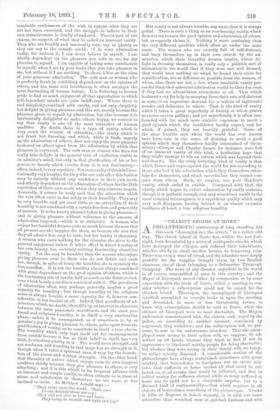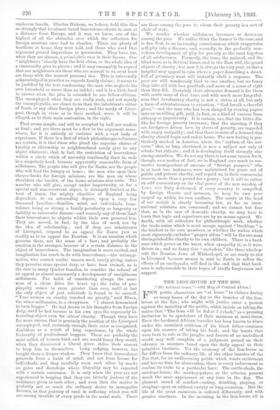"CHARITY BEGINS AT HOME."
APHILANTHROPIC controversy of long standing has this week "descended into the streets" in a rather odd way. The Greek island of Zante has, within the last fort- night, been devastated by a series of earthquake-shocks, which have destroyed the villages, and reduced their inhabitantet, who live chiefly in small wooden houses, to temporary ruin. There was even a want of bread, and the islanders were deeply grateful for the supplies brought them by two English steamers, one of them belonging to a Submarine Telegraph Company. The news of any disaster anywhere in the world is, of course, transmitted at once to this country; and the Mayor of Liverpool, moved either by compassion, or by some connection with the trade of Zante, called a meeting to con- sider whether a subscription could not be raised for the stricken island. Thereupon, the unemployed of Liverpool revolted, assembled in crowds, broke in upon the meeting, and demanded, in more or less threatening terms, to know why subscriptions should be sent to Zante, while the citizens of Liverpool were so near starvation. The Mayor, undaunted, remonstrated with the rioters, and, urged by the police, or, according to another account, convinced by argument, they withdrew; and the subscription will, we pre- sume, be sent to the unfortunate islanders. That the unem- ployed were wrong in their action will, we suppose, be ad- mitted on all hands, because they tried, in fact if not in appearance, to blackmail worthy people for being charitable; but whether they were wrong in their theory will, we fancy, be rather warmly disputed. A considerable section of the philanthropic have always maintained, sometimes with great acerbity, that benevolence to foreigners was an entire mis- take, that sufferers at home needed all that could be col- lected, or, at all events, that would be collected, and that to collect money for sufferers abroad while so many suffered at home was to yield not to a charitable impulse, but to a diseased kind of sentimentality,—that which requires in all objects of benevolence something of the picturesque. Greeks in kilts or Negroes in naked majesty, it is said, are more attractive than wretched men in patched fustians and with unshaven beards. Charles Dickens, we believe, held this idea so strongly that he almost hated benevolence shown to men at a distance from Europe, and it was, we know, one of the highest of all the obstacles over which the collectors for foreign missions once had to clamber. There are plenty of heathens at home, they were told, and those who used that argument proved impervious to persuasion. They have, too, when they are sincere, a primd-facie case in their favour. Our "neighbours "clearly have the first claim, or the whole idea of a community goes to pieces ; and it may reasonably be argued that our neighbours are those who are nearest to us, or at least are those with the nearest personal ties. This is universally acknowledged in practice as regards family claims; it seems to be justified by the text condemning the man who neglects his own household as worse than an infidel; and it is a little hard to answer when the plea is extended to our fellow-citizens. The unemployed, when they are really such, and not merely the unemployable, are closer to us than the inhabitants either of Zante or any other foreign place ; and the needy of Liver- pool, though in error as to their method, were, it will be alleged, as to their main contention, in the right.
That seems simple, and will be accepted by half our readers as final ; and yet there must be a flaw in the argument some- where, for it is entirely at variance with a vast body of experience. If there is a fact of which philanthropic collectors are certain, it is that those who plead the superior claims of kinship or citizenship or neighbourhood rarely give to any object whatever; that, in fact, the restriction of benevolence within a circle which of necessity continually draw in, ends in a singularly hard, because apparently reasonable, form of selfishness. The people who will give for Zante, are the people who will feed the hungry at home ; the men who open their cheque-books for foreign missions, are the men on whose shoulders the burden of the home missions also rests. The number who will give, except under importunity, or for a special and non-recurrent object, is strangely limited at the best of times, the mighty charities of England being dependent, to an astounding degree, upon a very few thousand families,—families, mind, not individuals, bene- volence being as strong a family peculiarity as longevity or liability to tubercular disease—and scarcely any of them limit their benevolence to objects within their own personal ken. They are moved, in fact, by the idea of need, not by the idea of relationship ; and if they are inhabitants of Liverpool, respond to an appeal for Zante just as readily as to an appeal for Everton. It is an emotion which governs them, not the sense of a fact; and probably the emotion is the stronger, because of a certain distance in the object of benevolence. The imagination is more excited, and imagination has much to do with benevolence—the unimagi- native, who cannot realise unseen need, rarely giving, unless they perceive some special duty, or have been trained, as is the case in many Quaker families, to consider the refusal of an appeal as almost necessarily a development of unrighteous selfishness. The habit of considering always the near- ness of a claim dries the heart up ; the value of pro- pinquity comes to seem greater than ever, until at last the only object of just solicitude is found to be oneself. " Your sermon on charity touched me greatly," said Elwes, the miser-millionaire, to a clergyman. "I almost determined to turn beggar." He had drawn in his thoughts from foreign duty, until he had become in his own eyes the supremely in- teresting object even for others' charity. Though they have far more excuse, that is precisely the position of the Liverpool unemployed, and, curiously, enough, their error is recognised, doubtless as a result of long experience, by the whole fraternity of professional beggars. These are probably the most selfish of human kind, and one would fancy they would, when they discovered a liberal giver, strive their utmost to keep him to themselves. Long cadging, however, has taught them a deeper wisdom. They know that benevolence proceeds from a habit of mind, and not from favour for individuals, and they carefully warn each other by marks on gates and doorsteps where liberality may be expected with a certain assurance. It is only when the poor are not experienced in begging that they are bitterly jealous of the assistance given to each other ; and even then the motive is probably not so much the ordinary desire to monopolise favours, as that jealousy of rank in suffering which you will see among invalids of every grade in the social scale. There
are those among the poor to whom their poverty is a sort of chair of state.
We wonder whether selfishness increases or decreases among the poor. We rather think the former is the case, and is due, first, to an increasing consciousness which exaggerates self-pity into a disease ; and, secondly, to the perfectly mar- vellous development of pity for poverty as the most hopeless of all misfortunes. Formerly, the lame, the maimed, and the blind were, as in Biblical times, and in the East still, the grand objects of charity ; but now it is always the very poor, so that a hospital may appeal in vain where a paper describing a street- full of pecuniary want will instantly elicit a response. The poor are still wondrously kind to one another, but we fancy they take aid with less gratitude and more of a sense of right than they did. Certainly their advocates demand it for them with mach more of that tone, and with much more forgetful- ness that involuntary charity is not a virtue at all, but only a form of submissiveness to extortion. "God loveth a cheerful giver,"—not the man who has been slanged by evening papers into an unwilling gift, paid, in fact, as a kind of ransom from obloquy or importunity. It is certain, too, that the bitter dis- like for foreign poverty increases ; that the starving, if they are foreigners driven here by stress of poverty, are regarded with angry antipathy ; and that there is more of a demand that charity should begin and end at borne. The new feeling is par- ticularly marked in America, where the "asylum of the uni- verse" idea, so long cherished, is now a subject not only of rebuke but ridicule ; and it is developing itself strongly also among ourselves. We do not say there is not some reason for it, though, as a matter of fact, we in England owe much to suc- cessive immigrations of swarms of "foreign paupers," who in at least two instances, were maintained for years out of public and private charity, and repaid us, in their commercial success, more than a pound for a penny ; but it will be rather an odd commentary on the vital power of the new worship of Love, vice Duty dethroned, if every country is compelled, by foreign threats and menaces, to keep its own poor cooped up within its own confines. The motto at the head of our article is clearly becoming law, as far as inter- national relations are concerned ; and we cannot but fear that, as in the case of domestic charity, we may have to learn that logic and experience are by no means agreed. We doubt, with all collectors for philanthropic work, whether the trade-union which is most savage against "blacklegs" is the kindest to its own members, or whether the nation which most rigorously excludes "pauper aliens" will be the one most distinguished for charity to its own children. There is a hard- ness which grows on the heart, when sympathy is, as it were, driven in ; and we fancy that "excluders," like those who boy- cott the Russian Jews of WhitechapeI, or are ready to riot in Liverpool because money is sent to Zante to soften the effects of an earthquake, will find in the end that that hard- ness is unfavourable to their hopes of kindly forgiveness and support.



































 Previous page
Previous page